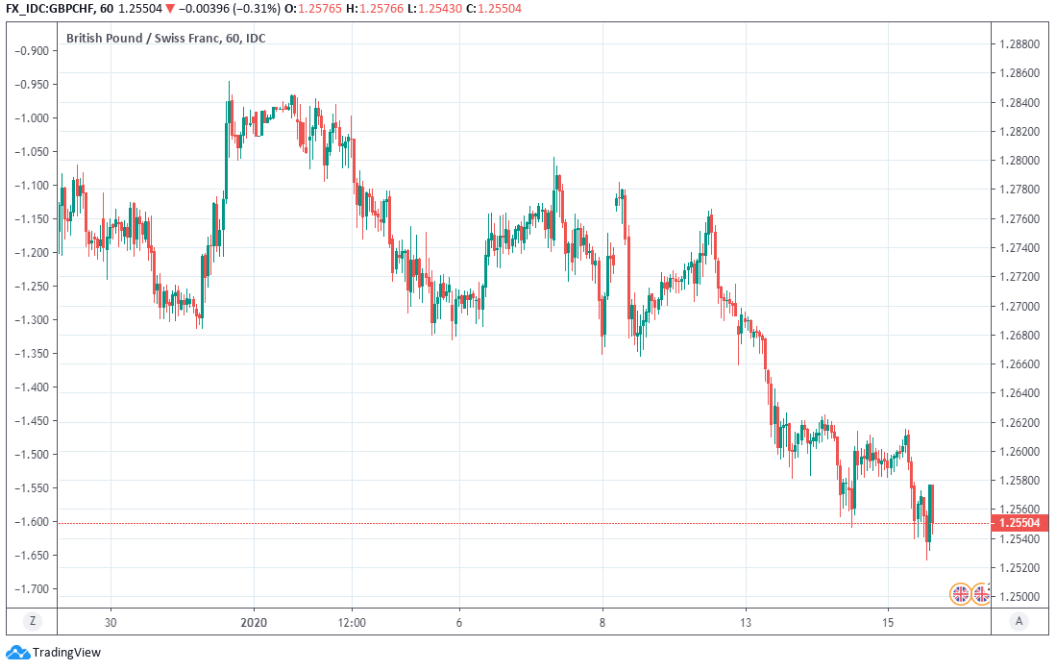The Swiss Franc Frustrates Bets on Pound after U.S. Treasury Feels SNB's Collar
- Written by: James Skinner
-
- CHF frustrates high hopes for GBP after U.S. Treasury decision.
- U.S. Treasury has Switzerland back on FX rigging monitoring list.
- Reducing scope for more SNB intervention to weaken the CHF.
- Decision prompts broad CHF rally, bites institutional GBP buyers.
- CHF knocks USD off perch as 2020's best performing major currency.

Image © SNB
- GBP/CHF Spot rate: 1.2557, down 0.34% for today
- Indicative bank rates for transfers: 1.2132-1.2220
- Transfer specialist indicative rates: 1.2383-1.2458
The Franc frustrated institutional buyers of Sterling this week after Washington said it'll be watching Switzerland closely for signs of currency manipulation in the months ahead, prompting a surge higher by the safe-haven unit.
Switzerland's Franc has knocked the Dollar off its perch as 2020's best performer since the country's central bank had its collar felt by the U.S. Treasury on Monday. It's also risen 1.6% against the Pound this week, leaving it 2.3% higher for 2020 and triggering the 1.2550 stop-loss that accompanied a Monday recommendation from TD Securities to buy the Pound-to-Franc rate and target a move from 1.27 to 1.30 over the coming weeks.
"We have been stopped out of our long GBPCHF, generating a 1.2% loss. We hit the stop-loss trigger on a mix of treacherous data from the UK and CHF-specific factors related to the US Treasury's latest FX report. On the GBP side, the latest data dump has motivated markets to expect a BoE cut later this month. The OIS market prices in a 65% chance of a cut at the January meeting, which we think is too soon to act," says Mark McCormick, head of FX strategy at TD, in a note to clients.
That trade was typical of how any institution might have played an ebbing of 'no deal' Brexit risk as well as the recent and ongoing improvement in investor risk appetite. And it should really have been a good one too. After all, the safe-haven unit is set to lose from Wednesday's signing of the long-elusive 'phase one deal' to end the trade war between the U.S. and China.
Above: Pound-to-Franc rate shown at hourly intervals.
The U.S.-China deal extends a lifeline to the troubled global economy and lessens investor demand for safe-haven assets like the Franc, Japanese Yen and government bonds of all stripes. And with Sterling expected to benefit from a large fiscal stimulus, details of which will be unveiled on Wednesday 29 January, the Pound was as good a candidate for gains over the Franc as any other currency even if the British unit has suffered of late as markets price-in the increased prospect of an interest rate cut.
But late Monday brought with it the latest U.S. Treasury report on the foreign exchange policies of major trading partners and included on the monitoring list inside it was Switzerland. In other words, Washington suspects Switzerland and the Swiss National Bank (SNB) of currency manipulation.
"This suggests that the US would now be more pleased with a stronger Swiss franc," says Oliver Korber, a strategist at Societe Generale. "The central bank now faces the risk of seeing markets testing its capacity to defend further appreciation. As the US economy slows, the market's appetite for safe havens looks set to grow. The JPY and CHF should be the main beneficiaries of these flows, mostly at the expense of the USD."
Above: USD/CHF rate shown at daily intervals.
Treasury criteria for 'currency manipulator' designation are simple in that a country must tick three boxes. It should have a trade surplus of more than $20 billion with the US, a current account surplus of more than 2% of GDP and have bought foreign currency equivalent to 2% of GDP over a 12 month period. Designation as a 'currency manipulator' could ultimately lead to trade tariffs and other measures being imposed on the guilty party.
Switzerland meets two of those three criteria in that it had a trade in goods and services surplus of $22bn last year, on U.S. Treasury numbers, and a current account surplus equal to 10.7% of GDP. It fell short on only the requirement to have acquired foreign currency equal to at least 2% of GDP over the last 12 months, with recorded purchased being equivalent to only 0.5% of GDP.
"EUR/CHF broke down to the lowest levels since early 2017 on fears that the US Treasury may frown on large scale SNB FX intervention. This fear has been around for some time, but with the Switzerland still toying with deflation we doubt the SNB is prepared is allow a large independent CHF rally," says Petr Krpata, chief EMEA strategist for FX and bonds at ING.
Above: Euro-to-Franc rate shown at weekly intervals.
The U.S. Treasury's foreign exchange report is much more of a political instrument than an economic one but that hasn't stopped Switzerland's currency from appreciating now the country has been included on the monitoring list. And given the inflation-targeting Swiss National Bank is still battling against disinflation and the threat of outright deflation, a clash with Washington and more strength in the Franc could now be in the pipeline.
"In an open economy such as Switzerland's with its high level of imports of preliminary products and consumer goods, exchange rate changes have an impact on import prices and therefore on the overall price level. This applies particularly in the case of strong exchange rate movements. Exchange rates enter into the SNB's analyses, as they can influence exports and thereby economic developments," the SNB says on its website.
Swiss monetary authorities are obliged by law to use policy levers like interest rates in order to deliver a 2% rate of inflation each year but the consumer price index has spent only three months above 1% in almost the last decade. That's to at least some degree the result of safe-haven flows into the Franc and the negative interest rate policies of the European Central Bank (ECB).
"The decision by the SNB to scrap its currency ceiling five years ago coincided with it slashing interest rates to a record low to reduce the attractiveness of holding Swiss francs," Andrew Kenningham, chief Europe economist at Capital Economics. "The SNB has relied on FX interventions to counter bouts of upward pressure on the franc since 2015, but we think it is only a matter of time before it acts to re-widen the interest rate differential. Accordingly, we forecast a rate cut, to -1.00%, albeit not until the second half of this year."
Above: Pound-to-Franc rate shown at weekly intervals.
The ECB's negative rates have increased the theoretical value of the Franc relative to the Euro and lifted other Swiss exchange rates, while occasional demand for a good old fashioned store of value has also played its part at times too. Those factors have reduced Swiss import costs and in turn the consumer price index, leading the SNB to miss its target.
Swiss Franc strength was dealt with early on by a mix of interest rate cuts and direct intervention in the currency market but with the SNB's benchmark also now far below zero, at -0.75%, the bank has had little choice but to increasingly rely on direct intervention. The causes of intervention and objectives behind it are not new, nor should they be controversial in a world where all reputable central banks are sincerely targeting set rates of inflation in a transparent way.
However, that hasn't stopped the U.S. from including Switzerland on the monitoring list or the Franc from appreciating.
"Traders looking for a re-rating of CHF higher might consider EURCHF short trades as a preferred vehicle as EURCHF is the dominant benchmark for the CHF exchange rate," says John Hardy, chief FX strategist at Saxo Bank. "Shorting here with a stop north of 1.0850 and a target below 1.0500 or even close to parity for a stretch target is one strategy, as any move back above 1.0850 would suggest that for now, this move lower has been a false break."
Above: Swiss Franc performance relative to major rivals in 2020. Source: Pound Sterling Live.
Time to move your money? The Global Reach Best Exchange Rate Guarantee offers you competitive rates and maximises your currency transfer. Global Reach can offer great rates, tailored transfers, and market insight to help you choose the best times for you to trade. Speaking to a currency specialist helps you to capitalise on positive market shifts and make the most of your money. Find out more here.
* Advertisement

